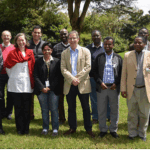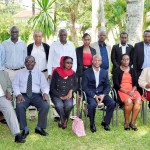Background:
In the eight countries constituting the Inter Governmental Authority on Development (IGAD) region over 70 percent of the territory is arid and semi-arid land (ASAL), occupied by an estimated 20 million pastoralists and agro pastoralists deriving their livelihoods from livestock husbandry.
In the course of working with pastoral communities and livestock production systems in the ASALs of the region, IGAD/ICPALD and IIRR realized the role a collaborative effort could play in tackling the marginalization of pastoral production systems and bolstering the wealth creation potentials of cross-border pastoral livestock value chains. The mobile nature of livestock keeping among pastoralist communities, the fact that such systems straddle political boundaries, and the close knowledge of both IGAD/ICPALD and IIRR in the workings of livestock value chains in the ASALs of the IGAD region have convinced the two organizations about the importance of piloting a livelihood-orientated project that uses cross-border trade as an entry point. Furthermore, the two organizations have observed the potentials of programmes (such as the Regional Initiative in Support of Vulnerable Pastoralists in the Horn of Africa – RISPA) that apply an integrated landscape planning approach to pastoral development and use cross-border economic and social interactions as building blocks. IGAD/ICPALD and IIRR are therefore encouraged to build on such experiences and implement catalytic value chain upgrading interventions in selected pastoralist hotspots so as to draw out lessons of experience for the wider IGAD region. The overall guidance and financial support to the project is organized by the Technical Centre for Agricultural and Rural Co-operation ACP-EU which is financed by the European Union (CTA). CTA is expected to provide about 80 percent of the funding of the Project, the remaining being a contribution from ICPALD and IIRR.
The Project will be implemented in contiguous pastoral communities across western Kenya and north-eastern Uganda with ramifications for the IGAD Region. The core area is actually an ecological zone known in Uganda as Karamoja and in Kenya as Turkana.
The project is comprised from four components, namely:
- Support structured multi-stakeholder dialogue fora on informal cross-border livestock trade (ICBLT) and promote linkages with formal trade actors.
- Explore innovative climate change information sharing mechanisms to build climate resilience in livestock value chains in pastoral areas.
- Facilitate the integration of promising ICT solutions into all nodes of pastoralist livestock value chains.
- Promote inclusive livestock value chain platforms for improved food and nutrition security and increased incomes.
The Project is jointly managed and implemented by ICPALD and IIRR. While ICPALD is directly responsible for the results and resources pertaining to the first two components of the Project, IIRR is responsible for the remaining two. The current activity or consultancy falls under component two and ICPALD responsibility.
1. Objective of mission:
This workshop has the following objectives:
1. To enhance understanding of key stakeholders on experiences with, and current initiatives on, pastoral livestock value chains and ICBLT in the project areas;
2. To deepen the understanding of key stakeholders (including collaborating partner organizations and beneficiaries) on project components and their linkages;
- To clarify respective roles and responsibilities of project contract holders and collaborating partner organizations; and
- To initiate the development of project-specific M & E framework including identification of appropriate baseline information.
2. Summary of proceedings / Outcome
At the opening ceremony, Dr Ameha Sebsibe, welcome the participants to the meeting on behalf of Ag Director, ICPALD and gave brief highlight on the project result areas. He emphasized that the project is regional focusing on Karamoja and West Pokot and implemented by IIRR and ICPALD. He went to say that livestock is a gold commodity in the region and that in 2015 alone, 12 million live animals were exported from ASAL areas. This was followed by the official opening by Dr Albin Sang, Deputy Director, Ministry of Agriculture and Livestock, Kenya who welcomed his colleagues and alluded on that there are clear policies and protocols in place to facilitate selling of animals across countries.
During the remaining sessions of this workshop, the following presentations were shared with participants:
- ICPALD’s mandate and experience in cross-border pastoral livestock value chains development
- IIRR’s experience and expertise in cross-border pastoral livestock value chains development
- CTA’s Flagship Project in Eastern Africa
- Overview of the Cross-border Pastoralist Value Chain Project and linkages between Project components.
- PGIS and its relevance for the Pastoralist Value Chain Project
- M & E Framework and identification of appropriate baseline information
3. Recommendations /Issues to follow up (by who and when)
- As the discussion is underway with ILRI and CTA on another separate regional project, a meeting was recommended to take place on 28th of June at ILRI HQ, Nairobi between ICPALD, IIRR and CTA. The meeting was intended to discuss the potential areas of collaboration between the three partners.
- As CTA will provide about 80% of the fund for the project, the partners agreed to team up to mobilize additional technical and financial resources from partners to help realize the full potentials of cross-border pastoral livestock value chains in the whole region.
- Start implementation of the four rapid appraisal studies by ICPALD and IIRR
- PGIS exercise led by IIRR will start end of July
- A 3-days workshop, facilitated by an M & E consultant, with implementing partners to develop an M&E framework during will take place 3rd week of August.






